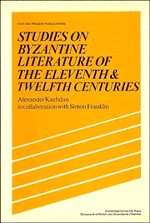Book contents
- Frontmatter
- Contents
- Prooemium
- Acknowledgement
- List of abbreviations
- I Approaches to the history of Byzantine civilization: from Krause to Beck and Mango
- II The social views of Michael Attaleiates
- III Theodore Prodromus: a reappraisal
- IV Eustathius of Thessalonica: the life and opinions of a twelfth-century Byzantine rhetor
- V Gregory Antiochus: writer and bureaucrat
- VI Nicephorus Chrysoberges and Nicholas Mesarites: a comparative study
- VII Nicetas Choniates and others: aspects of the art of literature
- Index
- Past and Present Publications
Prooemium
Published online by Cambridge University Press: 07 May 2010
- Frontmatter
- Contents
- Prooemium
- Acknowledgement
- List of abbreviations
- I Approaches to the history of Byzantine civilization: from Krause to Beck and Mango
- II The social views of Michael Attaleiates
- III Theodore Prodromus: a reappraisal
- IV Eustathius of Thessalonica: the life and opinions of a twelfth-century Byzantine rhetor
- V Gregory Antiochus: writer and bureaucrat
- VI Nicephorus Chrysoberges and Nicholas Mesarites: a comparative study
- VII Nicetas Choniates and others: aspects of the art of literature
- Index
- Past and Present Publications
Summary
The essays in this book are based on articles written in Russian before my departure from the Soviet Union in 1978. I am fortunate in having this opportunity to present them to a wider audience of my western colleagues.
In my approach to Byzantine literature I have been chiefly concerned with three questions. The first is traditional and, so to speak, documentary: the examination, or re-examination, of dates and facts. When was Eustathius promoted to the see of Thessalonica? Was the uncle of Theodore Prodromus really John II, metropolitan of Kiev? The importance of this kind of investigation is self-evident, even though individual factual arguments do not substantially alter our general impression of Byzantine literature and literati.
The second question is more controversial. I perceive Byzantine literati, or at any rate the greatest among them, as being involved in the real life of their time. Nor was this involvement only political (although many of them were in fact politicians, or wrote about political events): they belonged to various groups in Byzantine society, and their writings thus reflect various social concepts and moral tenets. One of my major goals has been the ‘social localization’ of Byzantine writers. Some of my specific conclusions may, I admit, be somewhat fragile, but the problem remains intriguing and worthy of study.
- Type
- Chapter
- Information
- Publisher: Cambridge University PressPrint publication year: 1984

